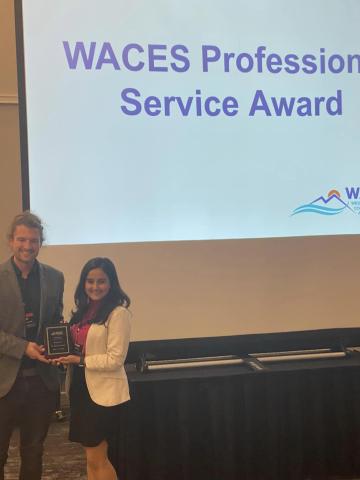
PAU Presentations and Awards at 2022 WACES Conference

Students, faculty, and alumni represented PAU with presentations, organizational leadership, and recognition at the 2022 Western Association for Counselor Education and Supervision (WACES) Conference that was held last month in Portland, Oregon. PAU has played an active role in WACES leadership. Shreya Vaishnav, PhD, who is WACES’s current secretary and webmaster, was recognized with the Professional Service Award. PAU faculty member Margaret Lamar, PhD, and Provost and Vice President of Academic Affairs Erika Cameron, PhD, are WACES past presidents.
The following presentations were made by members of the PAU community:
Developing Bilingual Pedagogy, Training, and Supervision
Karen Roller, Will Snow, Martha Hernandez, Jackie Grapa, Blanca Pineda, Edson Andrade Vargas
This presentation provided a preliminary roadmap and syllabus template for developing bilingual coursework, training and supervision of counseling students based on the experience of a team who has done so and continues to expand language-concordant programming in multidisciplinary sites. Addressing the federal laws for reasonable access to services for limited English proficient clientele, the team shared how they systematically reduced language-based treatment gaps.
Culturally Responsive Mentoring of Latino Graduate Students in Counseling
Matt Englar-Carlson, Edson Andrade Vargas
Despite expectations for counselor educators to serve as mentors, monocultural mentorship is often the norm. Intersectionality informed mentoring approaches more fittingly attend to the complexities of historically underrepresented students. Englad-Carlson and Vargas presented an intersectionality-informed mentoring approach to model to promote first-generation Latino counseling students’ self-authorship, understanding of the oppressive systems, and the use of resistance strategies to thrive in higher education.
Incorporating Service Learning Opportunities to Foster Counselors-in-Training's Cultural Humility
Szu-Yu Chen, Luis Martinez, Jackie Grapa, Rochelle Ritzi
Service-learning projects have been shown to enhance counselors-in-training’s multicultural competence and social justice awareness. Presenters demonstrated the findings of a qualitative study investigating the students’ experience of professional development through providing online parenting training for low-resource Latinx migrant caregivers. Insights were shared to inform counselor education training and recommendations for culturally-affirming service-learning implementation.
Training Counselors to work with Chronic Illness and Organ Transplantation
Cristen Wathen, Valen Keefer
This interactive session focused on working with chronic illness and organ transplantation with attention to medical disparities. Chronic illness impacts the emotional, spiritual, and relational aspects of one's life yet there is no specific training or specialty within the counseling field for this work. With a personal and research based perspective, presenters discussed keys to working with chronic illness, the transplant process, and included pedagogy tips for training counselors.
Cultivating Leaders of Color in Counselor Education and Supervision
Mariaimee Gonzalez, Erika Cameron
Across the United States, the lives of minority students and faculty are rich with experiences to make them qualified leaders in the counseling field. This presentation discussed the challenges many minorities face in their quest to achieve, balance, and perform effectively in various professional roles. The presenters discussed how to use cultural capital to obtain and thrive in positions of leadership, and ways of allyship to cultivate students and faculty’s leadership.
Using Artificial Intelligence to Change the Game in Training Counselors
Donna Sheperis, Carl Sheperis
Artificial Intelligence (AI) is known for application in tech industry spaces. However, the infusion of AI into health professions has grown quickly over the last decade. This presentation focused on the role of AI in counselor training and helping participants understand the functionality of AI within the context of counselor practice (e.g., the inherent ability of AI to “learn” the client-counselor relationship; track client progress; and track clinician adherence to treatment protocols).
Virtual Reality in the Classroom: Experiences of Innovative Technology for Counselors-In-Training
Cristen Wathen, Kelly Coker
Innovative teaching practices shape the development of counseling and its larger impact on wellbeing in today’s society. The goal of this session was to discuss findings utilizing a Virtual Reality (VR) based technology platform in a counseling department’s course curriculum. Participants heard student focus group feedback, learned about how VR was integrated into several key courses through assignments, readings, and virtual experience, and viewed the VR experience themselves.
Supporting East and Southeast Asian Clients: A Panel on Culturally-Centered Training and Practices
Szu-Yu Chen, Zachary Pietrantoni, Yun Shi, Maha Y. See
The contemporary needs of East and Southeast Asian clients require counselors to be competent in cultural, social-emotional, and family dynamics. These complex dynamics require educators to understand the uniqueness of East and Southeast Asian cultures. This panel discussion shared themes, challenges, and culturally-focused training and practices to work with counselors and counselor-in-training to support the mental health needs of East and Southeast Asian clients.
Counseling Womxn: Developing an Elective on Intersectional Issues in Women's Mental Health
Megan Speciale, Margaret Lamar
The goal of this roundtable was to discuss inclusive and evidence-based teaching practices related to a counseling elective in women's mental health. The course, entitled Counseling Womxn, highlights issues pertinent to the mental and emotional health of womxn, which includes cisgender, transgender, and nonbinary individuals who identify as women/female/femme. Attendees engaged in an interactive and collaborative discussion related to the teaching of these issues.
Collective Space: An Anti-Racist Strength Based Framework for BIPOC Mentorship
Colleen Lam Nguyen, Erika Cameron, Jeremiah Peck, Letitia Johnson, Jorge Lopez
Successful BIPOC mentorship and supervision relationships are critical in the development of all counselors, counselor educators and for the health and future of the counseling field. This session introduced an antiracist, strength based framework of BIPOC mentorship and attendees engaged in an interactive discussion about lived experiences and essential characteristics of a successful mentoring relationship for both the mentor and supervisor.
The Consideration of Lifespan Development Through a Cultural and Contextual Lens
Karen Roller, Kelly Coker, Savitri Dixon-Saxon, Kristi Cannon
Lifespan Development has commonly been taught centering WEIRD (white, educated, industrialized, rich, democratic) theories. The presenters sought to develop a textbook centering cultural and contextual dimensions of development, grounded in recent and relevant research, while still preparing students for licensure exams. In this presentation, they introduced the proactive use of supervision and networking to dismantle internalized oppression that may cause harm to clients, in support of anti-oppressive practice.
